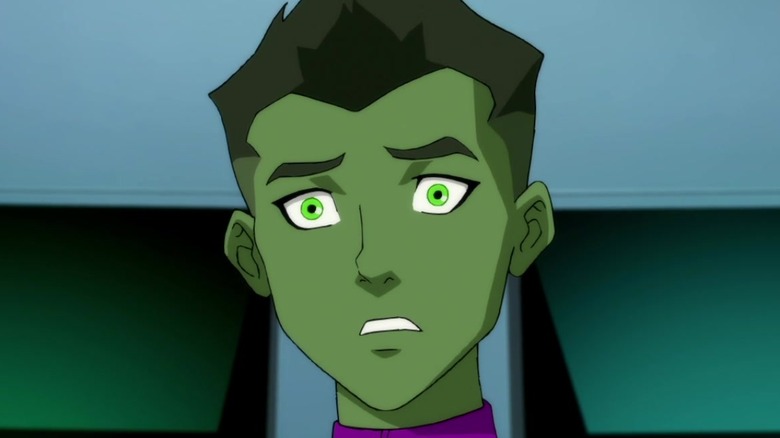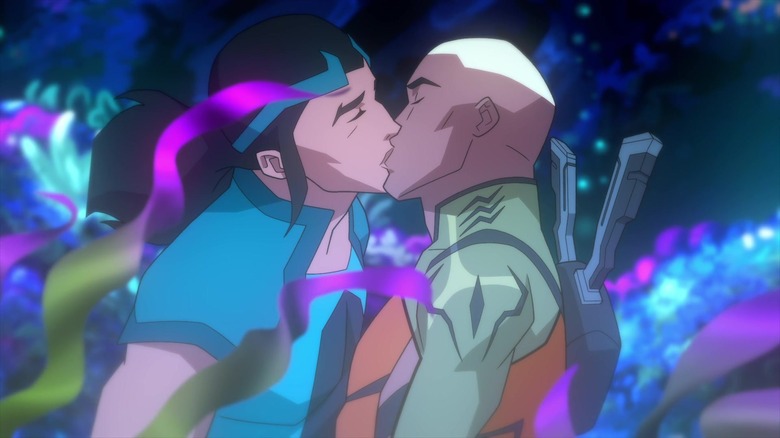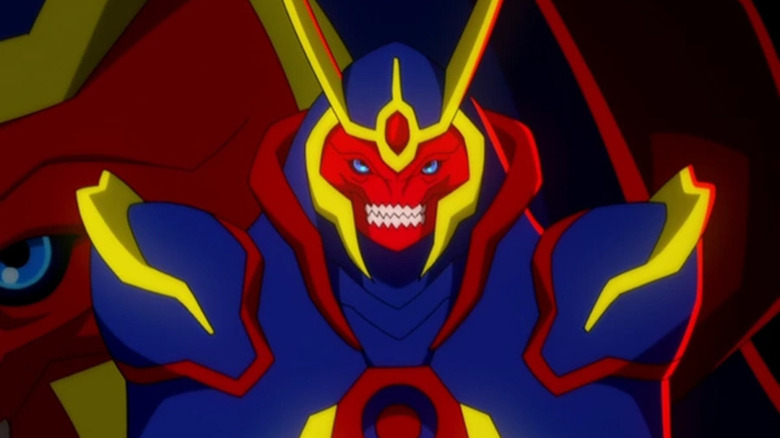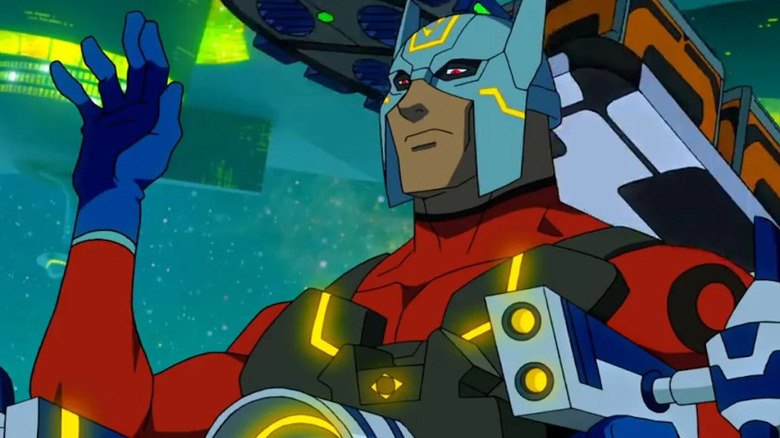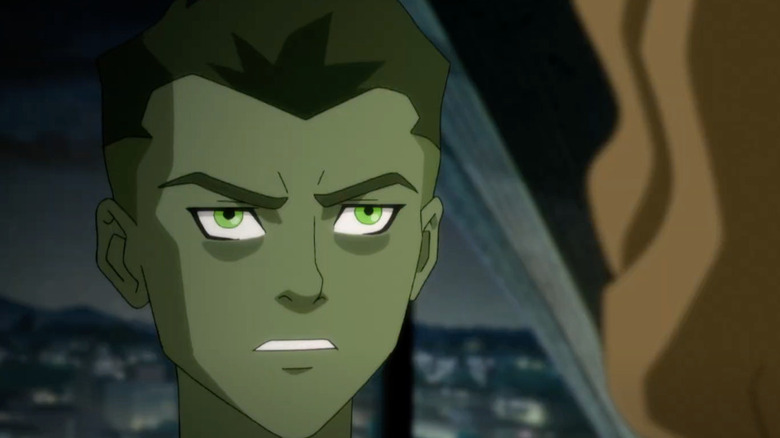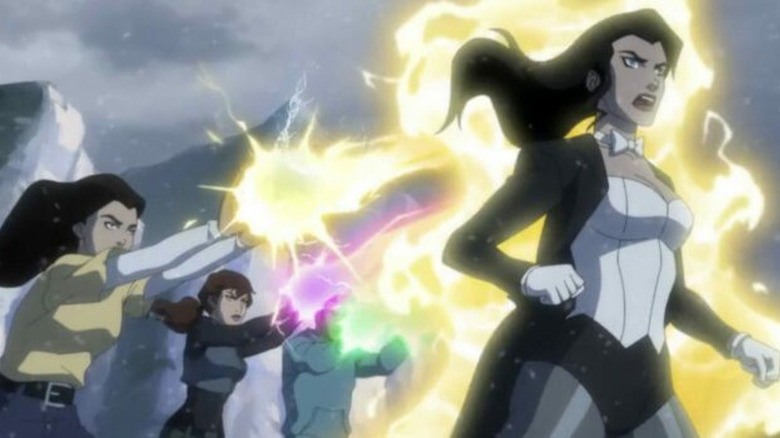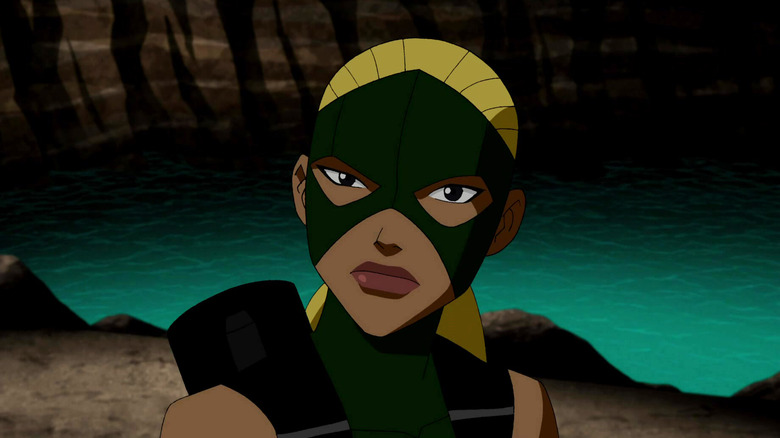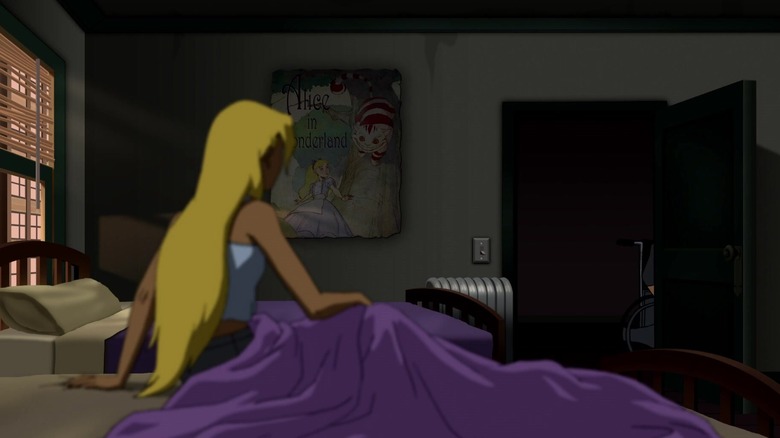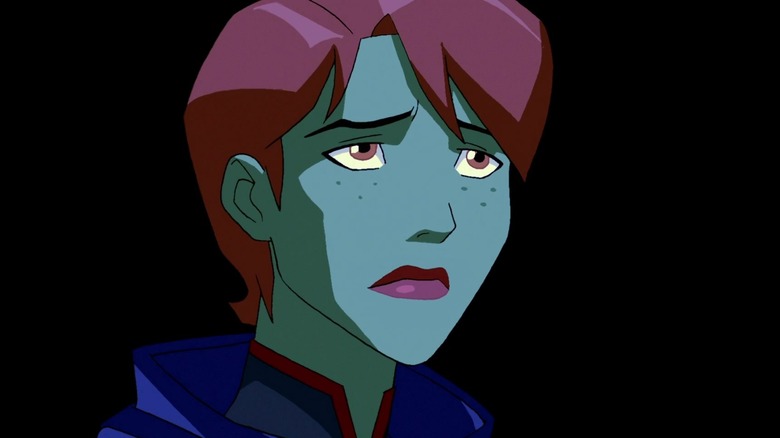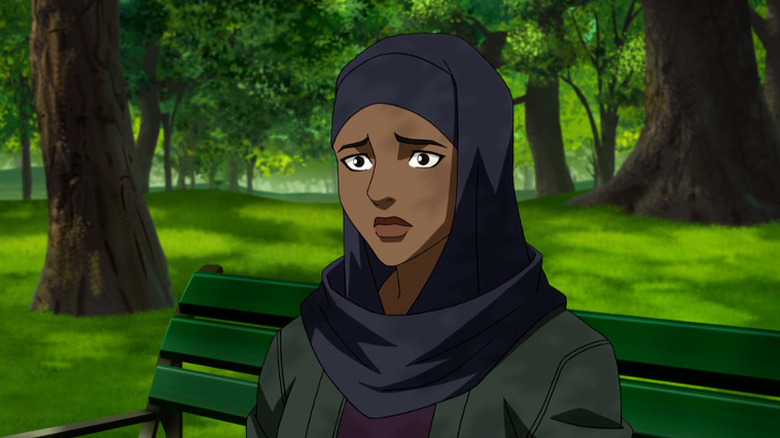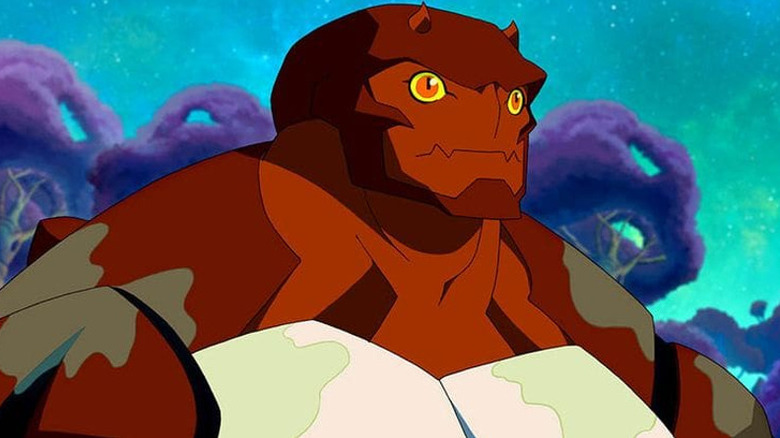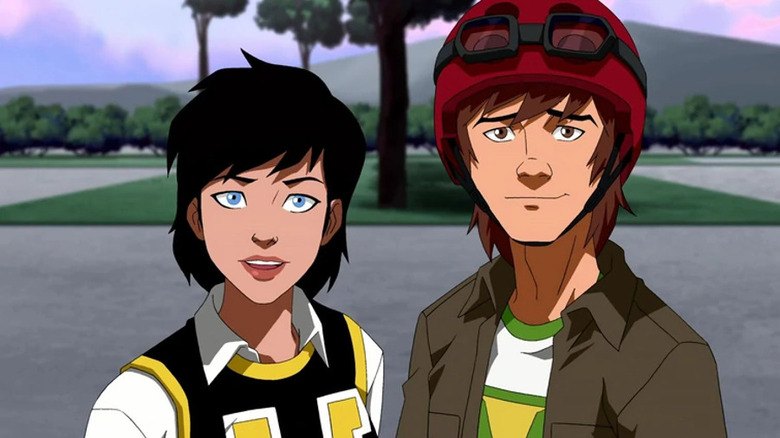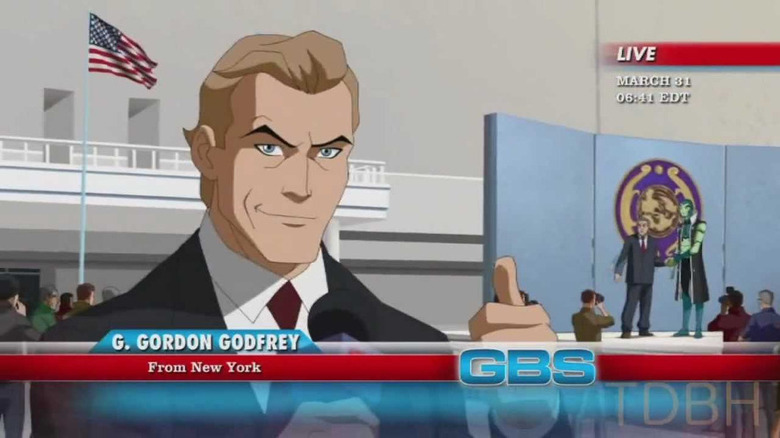Things That Only Adults Notice In Young Justice
"Young Justice" is an unusual show for many reasons, but one of the most prominent is the way it courts an adult audience. While there have been many excellent cartoons based on DC Comics properties over the years, most recent TV projects have been comedic and squarely aimed at kids, like "Teen Titans Go!" and "DC Super Hero Girls." When "Young Justice" premiered, it stood alone. It proceeded to make another bold move by aging up its young characters from season to season: Over the course of the series, these heroes grow from untested teenagers into adults with their own families, careers, and regrets.
"Young Justice" continues to set itself apart from other superhero cartoons by its depth and willingness to tackle real-world issues. This show explores trauma, racism, addiction, and colonialism, among other such weighty issues, and strives to represent a wide variety of marginalized people. There's still plenty here for kids to like, especially since new generations of teen heroes crop up in each season. But only the grown-ups in the audience will grasp the full scope of this remarkable animated series. From political metaphors to retro references, these are the things only adults notice in "Young Justice."
Atlantis is more progressive than the surface world
Atlantis has its problems. There's mistrust between different species, conflict between "pure" Atlanteans and outsiders, and a significant wealth disparity between the capital city of Poseidonis and the rest of the land. However, in many other ways, Atlantis is quite progressive in ways adults will understand and appreciate. For example, Kaldur (aka Aqualad, and later Aquaman) is bisexual — and Atlantis is completely at ease with this. His first crush is Tula, though he doesn't act on his feelings for her until it's too late. He later embarks upon his first relationship with Wyynde, a reformed Purist. Wyynde frequently works with Kaldur on missions, and even accompanies him to the surface. The fact that they're both men is not portrayed as being unusual in any way — it's just another part of Atlantean life.
La'gaan (aka Lagoon Boy) also represents Atlantis' forward-thinking culture. He dates Miss Martian for a while, but is belligerent and jealous of her past relationship with Superboy. Years later, he returns to Atlantis and enters into a polyamorous marriage with Coral and Rodunn, an Atlantean emissary and guard, respectively. Once again, this is introduced as a typical aspect of life in Atlantis.
The Martian caste system reflects our world
Martians are divided by a caste system not unlike ones that have existed on Earth. Green Martians form the majority of the population, while White Martians are in the minority. Rare Red Martians fills the ranks of the royalty. Yellow Martians, who make up the clergy, are not born, but made: They undergo a ceremonial process that permanently changes their skin color. Red Martians are at the top of this hierarchy, followed by Yellow, Green, and White.
King S'turnn J'axx is a progressive ruler who wants to mitigate the effects of this brutal system. He seeks to do this by scientifically proving that the differences between Martian groups are actually extraordinarily minimal. He also wants to strengthen the relationship between Earth and Mars, casting off the usual Martian xenophobia. But of course, he is of the Red class, and his beliefs can be best described as "separate but equal." He thinks Red Martians are superior to everyone, and forbids his son J'emm from marrying a Green Martian named S'yraa. Tragically, S'yraa accidentally kills the king when her powers flare out of control. His death proceeds to inflame vicious sentiments. Adults will instantly recognize this murderous prejudice as a metaphor: Martian bigotry reflects thousands of similar situations in our own world, ranging from the United States to India to South Africa.
Exploring neurodivergence
Before Rocket (aka Raquel Ervin) travels to New Genesis to work out an agreement with the New Gods, she drops off her young son Amistad with his father, Noble Davis. Amistad is autistic, which means Rocket follows a particular procedure to get him ready to leave the apartment. He's also sensitive to smell: On the subway, he reacts strongly to a woman's perfume. While Noble wants him to receive specialized help in school, Rocket isn't entirely okay with her son's diagnosis and is concerned he'll be stigmatized.
All of this is unusual territory for a superhero cartoon, but Orion's presence takes thing to an even more mature place. Rocket meets Orion on New Genesis and is immediately uncomfortable around him. Part of this comes from knowing he's Darkseid's biological son, but there are other factors at work as well. Orion has a clipped and formal manner of speaking, is obsessed with rules and protocol, and uses an assistive device (a Motherbox) to regain his composure. When Rocket puts him in a force field, she learns he has sensory issues and intense claustrophobia. Essentially, she doesn't understand him the way so many people don't understand her son, making this a powerful metaphor for neurodivergence.
Beast Boy has unresolved PTSD
Garfield Logan (aka Beast Boy) has experienced a lot of tragedy for someone so young. His mother is killed by the villain Queen Bee. His step-mother and adoptive family in the Doom Patrol are wiped out on a mission. Teammates Aquagirl and Flash also die on missions, as does Wally West, whose death hits him especially hard. Impressively, Gar is still resilient enough to put together a career as a TV star and start a new superhero group he dubs the Outsiders. However, when Geo-Force betrays the team and murders the villain Baron Bedlam, Gar feels he has failed as a leader.
The final straw is the death of Superboy. When Gar returns to Earth, he distances himself from his friends, stops going on missions, and quits his acting job. He spends most of his time sleeping (with the aid of pills) or obsessively scrolling through his phone. Though M'gann (aka Miss Martian) confronts him and later stages an intervention, Gar actively avoids seeking help. But M'gann is absolutely correct when she says he's dealing with depression and post-traumatic stress disorder.
As adults will notice, Gar's struggles are portrayed with depth and sensitivity. He deflects trauma with his fun-loving exterior, but as he grows older, these methods stop working. His substance abuse and obsessive behavior are understandable coping mechanism, but undeniably harmful. Seeking help is hard, as so many viewers know, but it's also necessary for him tor truly heal.
Zatanna is a bad mentor
When Chaos Lord Klarion causes a dimensional rift, Zatanna is forced to don the Helmet of Fate and become possessed by Nabu. After defeating Klarion, Nabu refuses to give up Zatanna's body. Her father Zatara strikes a deal with the powerful entity, agreeing to take her place as the new Doctor Fate.
As an adult, Zatanna takes on three proteges she dubs the Sentinels of Magic: Khalid Nassour, Thirteen, and Mary Bromfield. When the Chaos Lord Child wreaks havoc on Earth, Zatanna's group is able to defeat her. This is when Zatanna reveals her actual plan: She intends to rotate the role of Doctor Fate between herself and her students. This way, she can see her father again. As adult viewers will notice, this is pretty profoundly unethical. Even if it's for an important cause, Zatanna not only manipulates her students, she excludes Mary from the rotation, as she believes she's too drawn to power. The plain fact of the matter is, she uses them all for her own ends.
Bad parenting and chosen families
"Young Justice" often explores how bad parenting can lead young people to try to find a chosen family. The most extensive example is Artemis Crock (aka Tigress), daughter of the villain Sportsmaster. That cruel assassin becomes a single father after his wife takes the fall for both of them and winds up in prison. Artemis' older sister Jade (aka Cheshire) runs away from home and becomes an assassin, leaving Artemis to their father's tender mercies. Eventually, Artemis runs away and becomes a hero. She falls in love with Wally West (aka Kid Flash) and is devastated by his death. Settling in with her niece Lian and brother-in-law Will Harper (aka Red Arrow) takes the sting out of the situation, as does her mentorship of young heroes, team leadership, and eventual career as a professor.
One of the heroes Artemis works closely with is the mute Cassandra Wu-San, aka Orphan. Orphan is the daughter of the assassin Lady Shiva, who cut her vocal cords at a very young age so she'd focus on body language. After she escapes her life of crime, Orphan joins Artemis' team and finds a group of people who accept and nurture her. When her mother comes to claim her, Orphan rejects her and the life she represents. Many adults have been in both Artemis and Orphan's shoes here, and know well how important finding true family can be.
Secrets are isolating
Season 1 of "Young Justice" explores how secrets, no matter how well-intentioned, almost always wind up isolating the person keeping them. For example, M'gann claims to be the niece of J'onn J'onzz, the Martian Manhunter. She also says she's a Green Martian, as the superheroes of Earth are familiar with them. However, M'gann is actually a White Martian, and her true form is potentially terrifying to humans. All of this subterfuge is unnecessary, as her teammates accept her when her true form is finally revealed. M'gann endured loneliness and anxiety for absolutely no reason. Adult viewers are sure to be reminded of moments in their own lives when they kept a secret unnecessarily, and will groan in recognition.
Artemis is also secretive — in fact, her entry into the team is based on lies. After she escapes the clutches of her villainous and abusive father Sportsmaster, she desperately seeks a way to become a superhero. Unbeknownst to her, her mother has begged Batman and Green Arrow to help. Thus, Green Arrow claims that Artemis is his niece. But these secrets come back to hurt her and the team, as the Light tries to blackmail her into doing their bidding with this information. When Superboy confesses the truth about his cloned heritage, Artemis is emboldened to do the same. Kids know honesty is important, but only grown-up fans will grasp how fully it can set you free.
The ends do not always justify the means
Do the ends justify the means? "Young Justice" explores this classic question in a variety of ways. M'gann's telepathic powers provide a particularly potent angle. At first, she's reluctant to use her abilities, as her teammates tell her that reading minds — the main form of communication on Mars — is a major intrusion on Earth. But later, she psychically extracts information from her opponents with no remorse, justifying it as part of her mission. She even brain-blasts Aqualad when she thinks he's a traitor, only to learn (to her horror) that he's a deep-cover agent. After she and Superboy argue about this issue, M'gann erases his memory of their discord. She eventually repents for this behavior, but adult viewers won't soon forget about her slide down the slippery slope.
Similarly, when Lex Luthor becomes secretary-general of the UN and puts the Justice League on a leash, Batman forms his own covert team without informing his colleagues. As he opposes the Light, Luthor's cabal of supervillains, Batman dubs his group the Anti-Light. He proceeds to use the same kind of propaganda, misinformation, and manipulation that Luthor's group does, which includes inventing entire missions for the new, publicity-friendly superhero group the Outsiders. He's finally called out by Barbara Gordon, and rejoins the League under new leader Black Lightning's terms. But no one is likely to forget his hypocritical actions.
Nonbinary representation
Gender identity is a major topic in modern culture, and "Young Justice" addresses it with remarkable openness. The character code-named Halo starts life as a Quraci refugee named Gabrielle Daou. Tragically, Gabrielle is murdered by Count Vertigo's experiments. After being flung into a grave, Gabrielle's body merges with a Motherbox from New Genesis, and is reanimated.
This merger is disorienting, and it takes time for Halo (now operating under the civilian identity of Violet Harper) to adjust to life after death and a plethora of new powers. When they join the team, Artemis notes they've inducted two new girls in Halo and Terra. This bothers Halo, as their Motherbox spirit isn't gendered. Finally, Violet tells their friend Harper Row that they are nonbinary, and have decided to adopt they/them pronouns. As any adult will notice, this makes Halo a truly trailblazing character in superhero media and animation as a whole.
New Gods as colonizers
On New Genesis, home of the New Gods, there is a stark difference between where the two main races of the planet live. The New Gods live in Supertown, which floats above the surface of the planet. The Bugs, an intelligent insectoid race, live in caves and forests as part of different hives. The New Gods regard the Bugs as inferior and uncivilized. The Bugs resent the New Gods' presence and prejudice, which has occasionally tipped over into outright hostility. There have been treaties that prevent any New God from entering a Bug's hive without permission, but Orion is willing to violate them for what he sees as an urgent cause.
All of this is a clear metaphor for the long and ugly colonization of indigenous peoples. It grows even more vivid when one considers the New Gods' complete dismissal of the Bugs' culture, simply because it is different. The Bugs are a collective, with names that refer to their occupations. Forager, who joins the team after he's expelled from his hive, is one example — he even encounters another Forager from another hive at a later point. Bugs also have a deep connection with nature and their surroundings, which the New Gods disdain.
A new version of Wendy and Marvin
Many adults will find Wendy and Marvin familiar: They're the kid sidekicks on the 1973 animated series "Super Friends." The Super Friends consist of Superman, Batman, Robin, Aquaman, and Wonder Woman, who work alongside teen superheroes-in-training Wendy and Marvin and their talking pet, Wonder Dog. Instead of fighting the sort of ruthless supervillains who populate "Young Justice," the Super Friends mostly deal with environmental problems and mad scientists who need a stern lecture. Wendy and Marvin are clearly modeled according to the "Scooby-Doo" formula of teen detectives with an inexplicably talking animal. Though the duo contributes to plenty of adventures, they've been abandoned by most other animated DC projects.
Not by "Young Justice," though. Here, Wendy and Marvin are slyly introduced as Marvin White and Wendy Harris, who attend Happy Harbor High School alongside Superboy, Zatanna, and Miss Martian, among others. Marvin is portrayed as a goofy slacker who loves to pull pranks, much like his "Super Friends" incarnation. Clever Wendy quickly becomes friends with Conner Kent and Megan Morse, and joins the cheerleading squad alongside the latter hero. She later asks Conner for advice when she starts dating Marvin after graduation. Talk about a relationship long in the making — this one's been simmering since 1973!
Godfrey's xenophobia
In Season 2 of "Young Justice," a TV news host named G. Gordon Godfrey starts inflaming public opinion against aliens on Earth. It starts when an alien assassin attacks the U.N., but Godfrey soon rails against alien members of the Justice League like Superman and the Martian Manhunter. He tries to sow distrust among the public by asking the League what they're hiding by wearing masks and having an orbital headquarters. When the alien race known as the Reach arrives on Earth and introduces themselves at the U.N., he praises them for "going through the front door," unlike the aliens in the league.
Of course, G. Gordon Godfrey is actually Glorious Godfrey of Apokolips, an agent of the fiendish Darkseid working against the Justice League as an ally of Lex Luthor and the Light. He is deliberately using anti-alien rhetoric in the hopes of turning the public against the Justice League, to make the job of conquering Earth that much easier. Of course, adults will notice that this is precisely the kind of rhetoric used by opponents of immigration throughout the world. Like his real-world counterparts, Godfrey tries to make immigrants seem strange and inherently criminal, and scapegoats them for a wide variety of troubles. This is something that's been happening as long as immigration and borders have existed. Distinguishing between "model immigrants" and "bad immigrants" is another familiar part of the playbook, which Godfrey employs when he pits the Reach against the aliens of the League.
